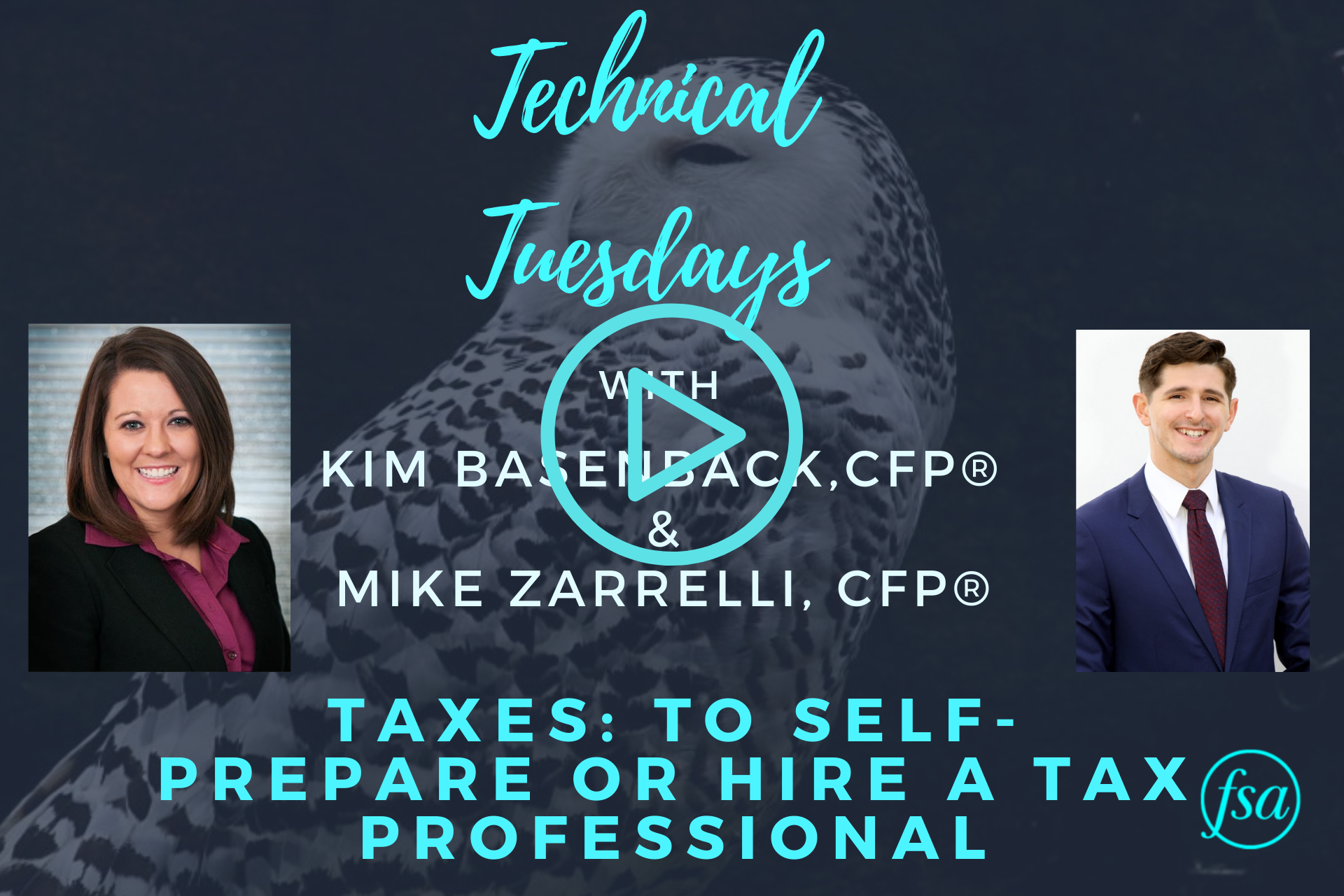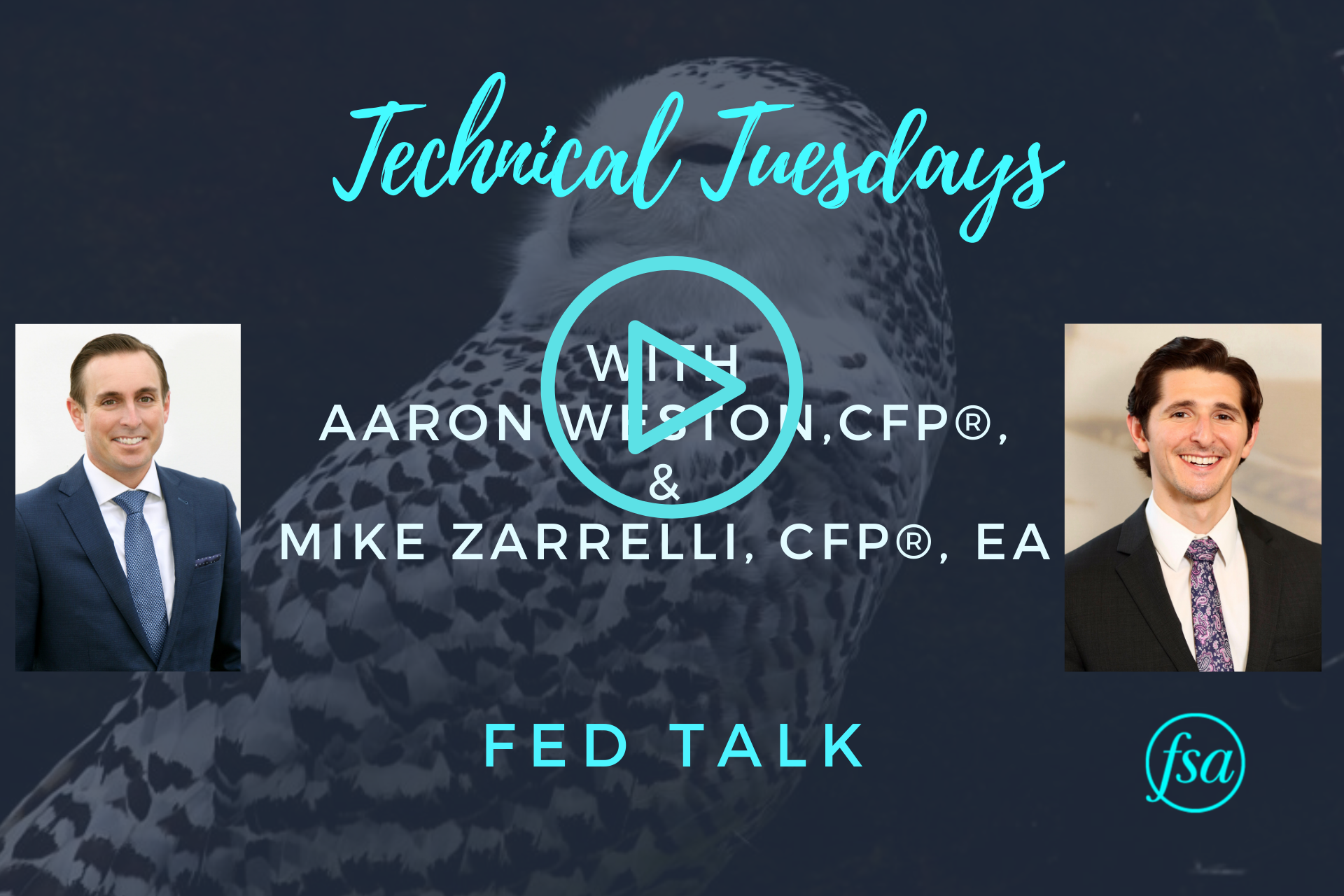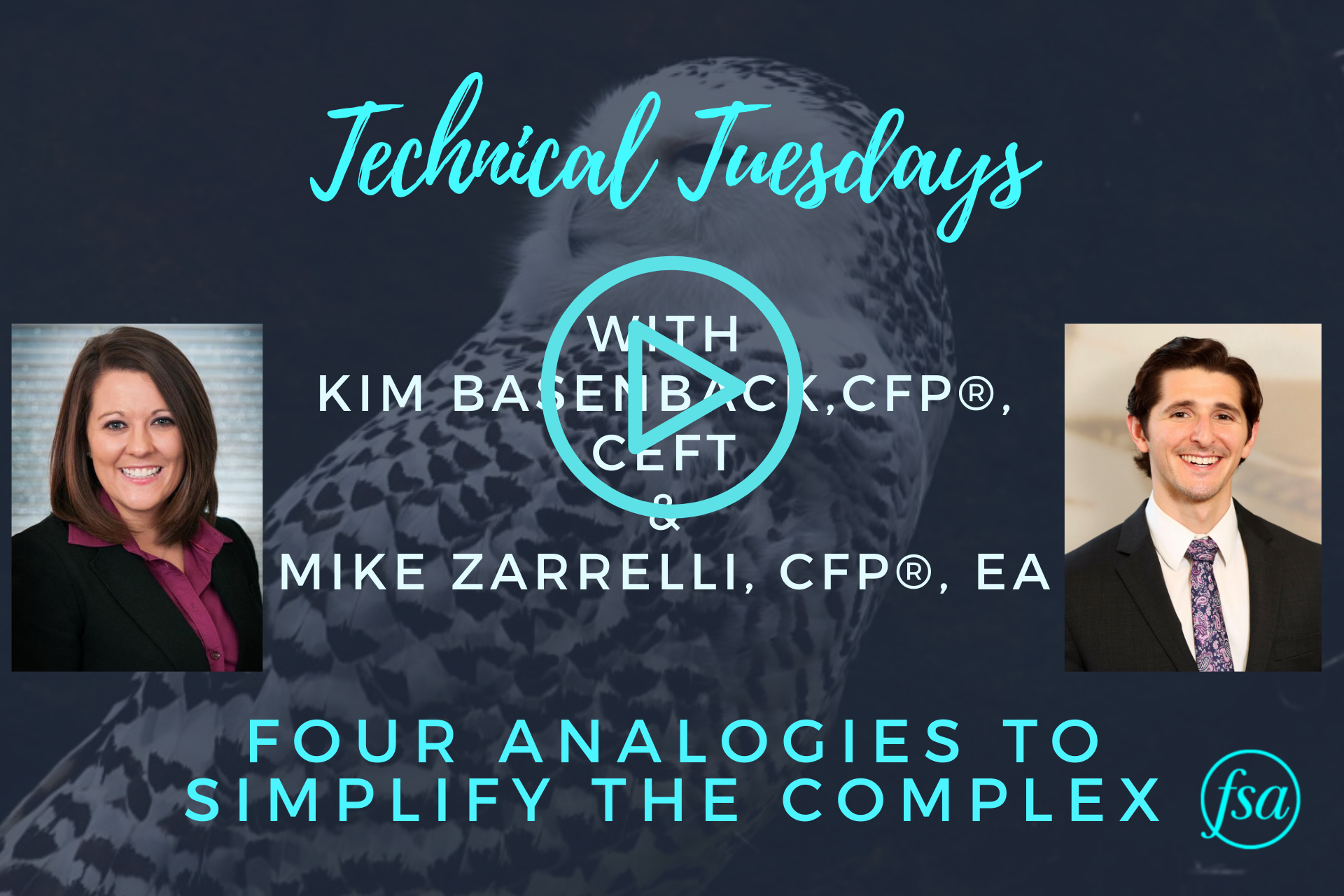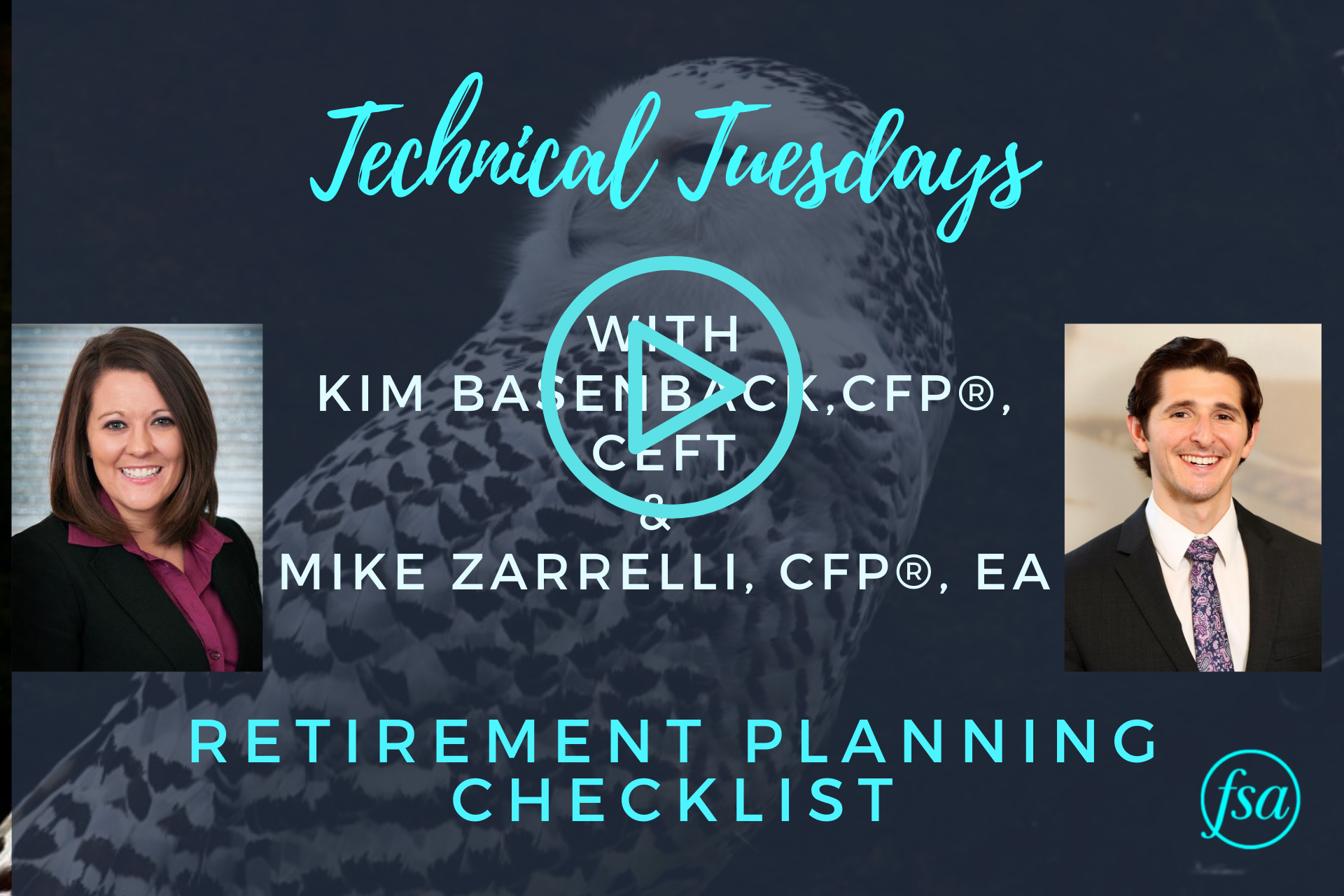Kim Basenback, CFP®, and Mike Zarrelli, CFP®, share their thoughts about when to prepare your own taxes and when to consider hiring a tax professional.
Taxes: To Self-Prepare or Hire a Tax Professional Transcript
Mike:
Hey, everyone. Welcome to this month’s Technical Tuesdays. I’m Mike Zarrelli, and with me I have Kim Basenback. Kim, how are you doing today?
Kim:
Doing great. How are you, Mike?
Mike:
Not bad. Can’t complain. So it is tax season, and we thought a perfect topic for tax season is to talk through self-preparing your taxes versus hiring a tax professional. When should you make that switch? So, Kim and I put our brains together and thought of a few questions to ask yourself when coming to that decision point. So, Kim, why don’t you just start us off? What questions would you ask yourself when determining to either self-prepare or hire a tax professional?
Kim:
Sure. Yeah. So, the first question you may want to ask yourself is how complex is your tax situation? The more complex your situation, the more sense it makes to hire someone and bring in some professional help. One of those areas of complexity would be how many sources of income do you have? Is it just one W-2 for you and your spouse and it’s a W-2 income? Or do you have rental properties that are even in different states? Do you have any business income? Are you getting K-1s from partnerships or S corps and trusts, estates? All of these things just add to the complexity of your situation. Then lastly, do you itemize? Again, the more complex, the more sense it makes to bring someone in to help.
Mike:
Yeah. Absolutely. Complexity is probably one of the main factors. The next question I would ask myself is do I have tax knowledge? If you’ve been doing your taxes for 30 years and self-filing, then you probably know your situation better than a CPA would, or you could, so that may make just sense to continue to self-prepare it. On the other hand, it’s normal to make a switch. We’ve had clients that have filed their taxes for 30 years and then in retirement they switched and hired a CPA just because they didn’t want the burden. Lastly, tax professionals have knowledge of some credits, some deductions that you or the tax software just may not be aware of, so there could be extra tax savings in that department, too.
Kim:
Yeah. That’s a great point, Mike. Another question you would ask yourself is do you have the time to complete your return. The IRS actually estimates that on average for a simple individual tax return that you should allot eight hours to complete that return. Now that includes time for record keeping, for planning, for actually completing and submitting your return. Obviously, that simple return would not include business income, rental properties, and such. When you start adding those things in for more complex returns, they estimate an average of 21 hours, so it can really take a lot of time to truly go through the information the way that you need to and make sure that your return is done correctly. So if you don’t have that time, that might be a trigger to want to outsource.
Mike:
Wow. Those hours really do add up, especially when you have businesses and rental properties and such. The last question that I’d probably ask myself is have I made a mistake before? If I have, maybe it does make sense to hire a tax professional to help avoid penalties, interest, or if I do get audited, a tax professional can represent you in front of the IRS and hopefully find a better outcome.
Mike:
So, now that we’ve kind of gone through the questions that you should ask yourself, I thought we’d turn it over to our personal lives. Kim, do you use a tax professional?
Kim:
Yeah. Actually this will be my first year engaging with a CPA, and I will say anytime you have a major life event, like getting married, divorced, buying a home, changing states, changing jobs, getting an inheritance, all of these are kind of triggers for considering hiring a CPA. For me personally, I had two of those where I got married and moved states, and given my husband’s tax situation – we talked about being more complex, his is – so for all those reasons we’re actually going to start working with a CPA. Mike, how about you?
Mike:
Yeah. It sounds like a huge transition year and totally makes sense to hire a tax professional. For me, on the other hand, I have a very simple tax situation. I only have W-2 income, I don’t own a house, and I don’t have rental properties or business income, so it’s pretty straightforward from there. On top of it, I’m studying to become an enrolled agent, which allows me to practice in front of the IRS and sign on tax returns and such, so it’s really fitting for me to do my own tax return and get that experience to help out with that certification.
Mike:
Now I wanted to turn it over. Financial advisors and CPAs kind of go hand-in-hand. Kim, what’s our firm’s perspective on using a tax professional?
Kim:
Yeah, so, we love working with clients’ CPAs and love when clients are working with CPAs because our professions go hand-in-hand, and there’s a lot of times where we can work with them because a CPA will know your tax situation inside and out, a lot more deeper than we can as financial planners, so there’s a lot of things that we can kind of ping on them and together navigate a lot more difficult financial situations. A couple examples of ways that we’ve worked with client CPAs: We actually had a client that inherited – I’m sorry, not inherited- who was gifted stock back in the ’80s, and on the investment side, when we sell something, that can realize capital gains for clients, and we needed to make sure their cost basis was correct, so their CPA was able to go back and help reconstruct what the basis was for that client. We’ve also worked with CPAs to determine whether a Roth conversion makes sense, and, if so, how much for a client. They’re really great at helping us to smooth out a client’s taxes over the years so that you’re not spiking into higher tax brackets, that you’re able to kind of even that out, so whether it’s a Roth conversion or just distributions during retirement, how much to pull from IRAs so that you’re not bumping into that tax bracket, that next tax bracket.
Mike:
Yeah. I totally agree. We’ve been doing a lot more Roth conversions, so we’ve been working hand-in-hand with CPAs to accomplish that. I think overall our message is when you’re self-preparing your tax returns you need three things, one being time, precision, and patience, and if you don’t have all three, then you might want to start thinking about hiring a tax professional. The IRS, they do studies, and from the 2020 E-filed tax returns, the majority of them were signed by tax pros, so most people were hiring somebody to complete their taxes. So I think if you want to reduce time spent on filing your taxes, or reduce some stress, or just make sure that no mistakes are made, then you may want to consider hiring a tax professional.
Mike:
Kim, any other messages you want to leave for our listeners?
Kim:
Yeah. I would just add onto that, if you do decide to hire a tax professional, we suggest that you talk to your friends and family and even your financial advisor to ask for referrals and see who they recommend, who are they working with, and find someone that you really trust that you can engage with. But if you have any questions on your specific situation, please reach out to us at questions@FSAinvest.com or at 301-949-7300.
Kim:
This has been Technical Tuesdays. Thanks so much.
Mike:
Thanks.
FSA’s current written Disclosure Brochure and Privacy Notice discussing our current advisory services and fees is available at www.FSAinvest.com/disclosures or by calling 301-949-7300.




